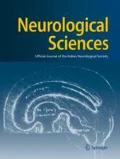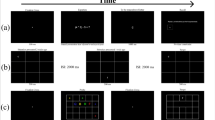Abstract
Alzheimer’s disease (AD), vascular dementia (VaD) and frontotemporal dementia (FTD) are the most common forms of dementia. It is well known that memory deficits in AD are different from those in VaD and FTD, especially with respect to cued recall. The aim of this clinical study was to compare the memory performance in 15 AD, 10 VaD and 9 FTD patients and 20 normal controls by means of a 24-item Grober-Buschke test [8]. The patients’ groups were comparable in terms of severity of dementia. We considered free and total recall (free plus cued) both in immediate and delayed recall and computed an Index of Sensitivity to Cueing (ISC) [8] for immediate and delayed trials. We assessed whether cued recall predicted the subsequent free recall across our patients’ groups. We found that AD patients recalled fewer items from the beginning and were less sensitive to cueing supporting the hypothesis that memory disorders in AD depend on encoding and storage deficit. In immediate recall VaD and FTD showed a similar memory performance and a stronger sensitivity to cueing than AD, suggesting that memory disorders in these patients are due to a difficulty in spontaneously implementing efficient retrieval strategies. However, we found a lower ISC in the delayed recall compared to the immediate trials in VaD than FTD due to a higher forgetting in VaD.



Similar content being viewed by others
References
Almkvist O, Fratiglioni L, AguÈero-Torres H, Viitanen M, BaÈckman L (1999) Cognitive support at episodic encoding and retrieval: similar patterns of utilization in community-based samples of Alzheimer’s disease and vascular dementia patients. J Clin Exp Neuropsychol 21(6):816–830. doi:10.1076/jcen.21.6.816.862
Apollonio I, Piamarta F, Isella V et al (2004) Frontal Assessment Battery (FAB). Demenze 2:28–33
Braak H, Braak E (1995) Staging of Alzheimer’s disease-related neurofibrillary changes. Neurobiol Aging 16:271–284. doi:10.1016/0197-4580(95)00021-6
Brun A, Englund E, Gustafson L, Passant U, Mann DMA, Neary D et al (1994) Clinical and neuropathological criteria for frontotemporal dementia. The Lund and Manchester Groups. J Neurol Neurosurg Psychiatry 57(4):416–418
Buschke H, Sliwinski MJ, Kuslansky G, Lipton RL (1997) Diagnosis of early dementia by the double memory test: encoding specificity improves diagnostic sensitivity and specificity. Neurology 48:989–997. doi:10.1212/WNL.48.4.989
Carlesimo GA, Sabbadini M, Fadda L, Caltagirone C (1995) Forgetting from long-term memory in dementia and pure amnesia: role of task, delay of assessment and aetiology of cerebral damage. Cortex 31(2):285–300. doi:10.1016/S0010-9452(13)80363-2
Carlesimo GA, Perri R, Caltagirone C (2011) Category cued recall following controlled encoding as a neuropsychological tool in the diagnosis of Alzheimer’s disease: a review of the evidence. Neuropsychol Rev 2(1):54–65. doi:10.1007/s11065-010-9153-7
Costa A, Monaco M, Zabberoni S, Peppe A, Perri R, Fadda L, Iannarelli F, Caltagirone C, Carlesimo GA (2014) Free and cued recall memory in Parkinson’s disease associated with amnestic mild cognitive impairment. PLoS One 9(1):e86233. doi:10.1371/journal.pone.0086233
Deweer B, Lehéricy S, Pillon B, Baulac M, Chiras J, Marsault C, Agid Y, Dubois B (1995) Memory disorders in probable Alzheimer’s disease: the role of hippocampal atrophy as shown with MRI. J Neurol Neurosurg Psychiatry 58(5):590–597. doi:10.1136/jnnp.58.5.590
Dubois B, Feldman HH, Jacova C, Dekosky ST, Barberger-Gateau P, Cummings J, Delacourte A, Galasko D, Gauthier S, Jicha G, Meguro K, O’Brien J, Pasquier F, Robert P, Rossor M, Salloway S, Stern Y, Visser PJ, Scheltens P (2007) Research criteria for the diagnosis of Alzheimer’s disease: revising the NINCDS-ADRDA criteria. Lancet Neurol 6(8):734–746. doi:10.1016/S1474-4422(07)70178-3
Fahlander K, Wahlin A, Almkvist O, Bäckman L (2002) Cognitive functioning in Alzheimer’s disease and vascular dementia: further evidence for similar patterns of deficits. J Clin Exp Neuropsychol 24(6):734–744. doi:10.1076/jcen.24.6.734.8404
Fossati P, Coyette F, Ergis AM, Allilaire JF (2002) Influence of age and executive functioning on verbal memory of inpatients with depression. J Affect Disord 68:261–271. doi:10.1016/S0165-0327(00)00362-1
Frasson P, Ghiretti R, Catricalà E, Pomati S, Marcone A, Parisi L, Rossini PM, Cappa SF, Mariani C, Vanacore N, Clerici F (2011) Free and cued selective reminding test: an Italian normative study. Neurol Sci 32:1057–1062. doi:10.1007/s10072-011-0607-3
Grober E, Buschke H (1987) Genuine memory deficits in dementia. Dev Neuro Psychol 3:13–36. doi:10.1080/87565648709540361
Grober E, Buschke H, Crystal H, Bang S, Dresner R (1988) Screening for dementia by memory testing. Neurology 38(6):900–903. doi:10.1212/WNL.38.6.900
Grober E, Lipton RB, Hall C, Crystal H (2000) Memory impairment on free and cued selective reminding predicts dementia. Neurology 54(4):827–832. doi:10.1212/WNL.54.4.827
Grober E, Hall C, Sanders AE, Lipton RB (2008) Free and cued selective reminding distinguishes Alzheimer’s disease from vascular dementia. J Am Geriatr Soc 56(5):944–946. doi:10.1111/j.1532-5415.2008.01652.x
Grober E, Hall C, Lipton RB, Zonderman A, Resnick S, Kawas C (2008) Memory impairment, executive dysfunction, and intellectual decline. J Int Neuropsychol Assoc 14:266–278. doi:10.1017/S1355617708080302
Grober E, Ocepek-Welikson K, Teresi JA (2009) The free and cued selective reminding test: evidence of psychometric adequacy. Psychol Sci 51(3):266–282
Hachinski VC, Iliff LD, Zilhka E, DuBolay GH, McAlister VL, Marshall J, Ross-Russell RW, Symon L (1975) Cerebral blood flow in dementia. Arch Neurol 32:632–637
Herlitz A, Lipinska B, Bäckman L (1992) Utilization of cognitive support for episodic remembering in Alzheimer’s disease. In: Bäckman L (ed) Memory functioning in dementia. Elsevier, Amsterdam, pp 73–96
Hornberger M, Piguet O (2012) Episodic memory in frontotemporal dementia: a critical review. Brain 135:678–692. doi:10.1093/brain/aws011
Ivanoiu A, Adam S, Van der Linden M, Salmon E, Juillerat AC, Mulligan R, Seron X (2005) Memory evaluation with a new cued recall test in patients with mild cognitive impairment and Alzheimer’s disease. J Neurol 252(1):47–55. doi:10.1007/s00415-005-0597-2
Korczyn AD, Vakhapova V, Grinberg LT (2012) Vascular dementia. J Neurol Sci 322:2–10. doi:10.1016/j.jns.2012.03.027
Kramer JH, Jurik J, Sha SJ, Rankin KP, Rosen HJ, Johnson JK, Miller BL (2003) Distinctive neuropsychological patterns in frontotemporal dementia, semantic dementia, and alzheimer disease. Cogn Behav Neurol 16(4):211–218
Lafosse JM, Reed BR, Mungas D, Sterling SB, Wahbeh H, Jagust WJ (1997) Fluency and memory differences between ischemic vascular dementia and Alzheimer’s disease. Neuropsychology 11(4):514–522. doi:10.1037/0894-4105.11.4.514
Looi JCL, Sachdev PS (1999) Differentiation of vascular dementia from AD on neuropsychological tests. Neurology 53(4):670–678. doi:10.1212/WNL.53.4.670
McKhann GM, Knopman DS, Chertkow H, Hyman BT, Jack CR Jr, Kawas CH, Klunk WE, Koroshetz WJ, Manly JJ, Mayeux R, Mohs RC, Morris JC, Rossor MN, Scheltens P, Carrillo MC, Thies B, Weintraub S, Phelps CH (2011) The diagnosis of dementia due to Alzheimer’s disease: recommendations from the National Institute on Aging-Alzheimer’s Association workgroups on diagnostic guidelines for Alzheimer’s disease. Alzheimer’s Dement 7(3):263–269. doi:10.1016/j.jalz.2011.03.005
Measso G, Cavarzeran F, Zappalà G, Lebowitz BD, Crook TH, Pirozzolo FJ, Amaducci LA, Massari D, Grigoletto F (1993) The mini-mental state examination: normative study of a random sample of Italian population. Dev Neuropsychol 9:77–85. doi:10.1080/87565649109540545
Neary D, Snowden JS, Gustafson L, Passant U, Stuss D, Black S, Freedman M, Kertesz A, Robert PH, Albert M, Boone K, Miller BL, Cummings J, Benson DF (1998) Frontotemporal lobar degeneration: a consensus on clinical diagnostic criteria. Neurology 51(6):1546–1554. doi:10.1212/WNL.51.6.1546
Neary D, Snowden J, Mann D (2005) Frontotemporal dementia. Lancet Neurol 4:771–780. doi:10.1016/S1474-4422(05)70223-4
Novelli G, Papagno C, Capitani E, Laiacona M, Vallar G, Cappa SF (1986) Tre test clinici di ricerca e produzione lessicale: taratura su soggetti normali. Archivio di Psicologia, Neurologia e Psichiatria 47:278–296
Pasquier F, Grymonprez L, Lebert F, Van der Linden M (2001) Memory impairment differs in frontotemporal dementia and Alzheimer’s disease. Neurocase 7:161–171. doi:10.1093/neucas/7.2.161
Petersen RC, Smith GE, Ivnik RJ, Kokmen E, Tangalos EG (1994) Memory function in very early Alzheimer’s disease. Neurology 44:867–872. doi:10.1212/WNL.44.5.867
Román GC, Royall DR (1999) Executive control function: a rational basis for the diagnosis of vascular dementia. Alzheimer Dis Assoc Disord 13(3):S69–S80
Sachdev P, Kalaria R, O’Brien J, Skoog I, Alladi S, Black SE, Blacker D, Blazer DG, Chen C, Chui H, Ganguli M, Jellinger K, Jeste DV, Pasquier F, Paulsen J, Prins N, Rockwood K, Roman G, Scheltens P (2014) Diagnostic criteria for vascular cognitive disorders: a VASCOG statement. Alzheimer Dis Assoc Disord 28(3):206–218. doi:10.1097/WAD.0000000000000034
Tuokko H, Vernon-Wilkinson R, Weir J, Beattie BL (1991) Cued recall and early identification of dementia. J Clin Exp Neuropsychol 13(6):871–879. doi:10.1080/01688639108405104
Whitwell JL, Przybelski SA, Weigand SD, Knopman DS, Boeve BF, Petersen RC, Jack CR (2007) 3D maps from multiple MRI illustrate changing atrophy patterns as subjects progress from mild cognitive impairment to Alzheimer’s disease. Brain 130:1777–1786. doi:10.1093/brain/awm112
Zola-Morgan S, Squire LR (1993) The neuroanatomy of memory. Annu Rev Neurosci 16:547–563. doi:10.1146/annurev.ne.16.030193.002555
Acknowledgments
The authors are grateful to Luigi Trojano and Massimo Nuzzo for referring the patients to us. Furthermore, we would like to thank Marcello Gallucci for advice on the data analysis.
Author information
Authors and Affiliations
Corresponding author
Ethics declarations
Conflict of interest
The authors declare that there is no conflict of interest.
Rights and permissions
About this article
Cite this article
Cerciello, M., Isella, V., Proserpi, A. et al. Assessment of free and cued recall in Alzheimer’s disease and vascular and frontotemporal dementia with 24-item Grober and Buschke test. Neurol Sci 38, 115–122 (2017). https://doi.org/10.1007/s10072-016-2722-7
Received:
Accepted:
Published:
Issue Date:
DOI: https://doi.org/10.1007/s10072-016-2722-7




